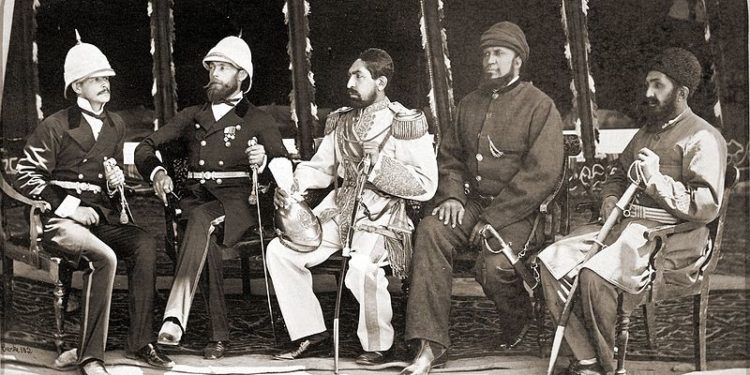During the establishment process of the new Iran government, in 1932, Turkey, intimidated by Iran being a colony of Britain, supported Shah Reza to come into power. Meanwhile, the main purpose of Britain was to maintain authority in Mosul, to have control over interests. Or oil, to be more specific.
Turkey was certainly not pleased with the resolution of the League of Nations dated December 16, 1925, that gave Mosul to Iraq because Britain was standing a dominant position in League of Nations.
In 1926 Britain and Turkey settled a bilateral agreement which stated that Turkey gave up their policy over Mosul. There were two reasons led this decision: the first one was The Sheik Said Rebellion in northern Kurdistan, the other was Atatürk’s fear to wage a war against Britain.
THE SHEIKH SAID REBELLION
The Sheikh Said Rebellion, that saw the participation of Kurdish and Zaza tribes, was claimed to be preplanned by the British state, as a defence plan should Turkey decide to react regarding Mosul.
To understand, firstly we should look at the 1923 Lausanne Treaty. This treaty was a cornerstone for Turkish foreign policy and Turkey satisfied with the settlement. The problem remains that the whole of Kurdistan was divided into four and handed to neighbouring countries by British colonialists. The furious Kurds were only calmed with a promise for independence.
Thıs was the exact reason the Sheikh Said rebellion broke out: an unfulfilled promise of independence to the people of Kurdistan.
TURKEY IRAN RELATIONS AFTER LAUSANNE
On top, their Lausanne treaty left several additional problems such as Mosul, Hatay, straits and exchange of population issues. Simultaneously, new rebellions started, causing newly emerged tensions among Turkey and Iran.
In 1932, two agreements were signed between Turkey and Iran. One of them was to solve the border issue; one of them was to cooperate in the legal fields.
THE BALKAN PACT
After 1933, Italy was perceived as a probable enemy by Turkey. Italy was a revisionist state that could not satisfy her desires during World War 1. Therefore, she had desires on Balkan states and mostly in Turkey.
Yugoslavia, Romania and Greece were enlarged countries which wanted to keep the status quo in Balkans. On the other hand, Bulgaria, Hungary and Albania pursued a revisionist policy in Balkans. In order to reach a general consensus among Balkan states, the countries conducted conferences between 1930 and 1933 which were resulted in Balkan Pact in 1934.
THE SAADABAD PACT
In 1937, Turkey participated in the Saadabat Pact in which also Iran, Iraq and Afghanistan join; establishing an entente, similar to the Balkan understanding of 1934 which aimed to create a security umbrella on Middle Eastern countries.
A crucial point in the Saadabad Pact was that neither Iran nor Iraq would support any Kurdish rebel on Turkey or vice versa.
NECESSITIES OF THE PACT
Desperate, Turkey tried to sign non-aggression agreements with every single major power because, in the time, there was no NATO to guarantee common security. It was only possible with bilateral agreements. Нerefore the first necessity of Turkey is to provide common security for itself. Secondly, Turkey wanted to solve border issues with Iran, so that the Kurds would have no power in reclaiming Kurdistan.
When the articles of the agreement are examined, it is clearly seen that the agreement was signed for regional purposes rather than a threat from outside of the region. The priority of founders was to avoid the Kurdistan peoples creating a threat.




